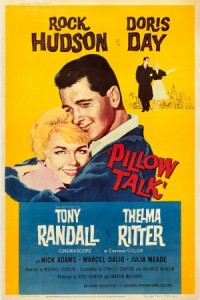|

Synopsis:
When a frustrated interior designer (Doris Day) lashes out at the playboy composer (Rock Hudson) who’s been monopolizing their party line, Hudson retaliates by wooing her in the guise of Texas oilman “Rex Stetson” — much to the chagrin of her would-be suitor (Tony Randall), who also happens to be good friends with Hudson.
|
|
Genres, Themes, Actors, and Directors:
- Doris Day Films
- Love Triangle
- Mistaken or Hidden Identities
- Rock Hudson Films
- Romantic Comedy
- Thelma Ritter Films
- Tony Randall Films
Response to Peary’s Review:
Peary labels this “Stanley Shapiro-scripted American sex comedy, co-written by Maurice Richlin, lavishly produced by Ross Hunter, and bringing together Doris Day and Rock Hudson ([in] his first comedy) for the first time” as “quintessential”. Yet he simultaneously refers to it as a “claustrophobic comedy… full of unfunny sexual innuendo” which “has a smutty feel to it”. He argues that the “film seems to imply that because [Day] has a job rather than a love/sex life, she feels much anger and hostility”; at the same time, however, he concedes that Day’s character is actually quite laudable and progressive, given that “she seems more determined to maintain personal integrity than her virginity; [she believes] having a boyfriend is more important than having a husband; she is as successful at work as Hudson is; [and] she does not take being treated badly lying down — she has claws”.
I’m not quite sure I agree with Peary’s cynical take on this one. Surprisingly, I didn’t find it “smutty”; instead, I simply enjoyed the calculated sexual banter liberally sprinkled throughout the screenplay:
Day: “I have no bedroom problems; there’s nothing in my bedroom that bothers me.”
Hudson: “Oh, that’s too bad…”
Yes, Day and Hudson go at it like the inevitable to-be-couple they’re posited as from the beginning — but them’s the rules of this particular genre. And it’s exactly Day’s strength and feistiness as a female protagonist (outlined by Peary himself) that prevent the film from descending into ho-hum mid-century mores. Meanwhile, though one really should detest Hudson’s character on some level (given that the charade he’s carrying out it with Day is questionable at best, and mean-spirited at worst), somehow his character remains oddly likeable throughout. I’ll bet this is due in large part to the fun Day and Hudson admitted to having with each other on set; their (asexual) attraction to one another is in clear evidence.
Redeeming Qualities and Moments:
Must See?
Yes, as a classic mid-century romantic comedy.
Categories
Links:
|
One thought on “Pillow Talk (1959)”
A must – as a memorably comic romp with inspired casting of leads.
In one midway-sequence of this delicious bonbon, Day and Hudson are again conversing on their party line when Hudson’s character decides to have a little extra fun by switching his voice back-and-forth between the man Day is falling for and the one she detests. At this point, Hudson the actor clearly seems to be enjoying himself to such a degree that he genuinely, silently cracks up. This particularly delightful moment reveals that Hudson is having the time of his life with acting – and playing opposite Day. Throughout the film, Day also loosens up in a similar, if more reserved way. (Her character is much more under her own control. Nevertheless…) Whoever had the idea to put these two together must have been slap-happy about it. Is there another acting team that could have pulled this off? It’s doubtful. For ‘PT’ to work, it needed the most gorgeous guy available in league with the woman most adept at conveying ‘pure’ indignation. (Who does wide-eyed befuddlement better than Doris?)
Thus, ‘PT’ heads off the Day-Hudson triptych – all three of which are must-sees (if you ask me). I see it this way: ‘PT’ is the engaging dating period for these two; ‘Lover Come Back’ (the best of the three) is the full-throttle relationship; ‘Send Me No Flowers’ moves us into the blissful, settled comfort of a cozy marriage (by now, the two actually appear as a married couple).
Everything works here. A good script still needs good timing and Michael Gordon has directed in a breezy, seamless manner which makes this vehicle burn rubber.
Perhaps what’s most ahead of its time is the inclusion of gay humor – when Hudson’s Rex hints that his character may possibly be ‘very close to his mother’. (This on top of the scene in which a doctor is led to believe that Hudson is pregnant! ~ which, of course, turns out to be “a false alarm”.)
Special – honorable – mention to sidekicks Randall and Ritter. Not only do they shine in their own right, but they add luster to the leads. Each of them has a certain deadpan quality that serves to balance the wackiness Doris and Rock are swimming in.
[I noticed that I posted on ‘Lover Come Back’ in 2008. A year or so later, I wrote ‘My Night with Rock Hudson’. Clearly, the Day-Hudson duo had real staying power for this humble film fanatic.]